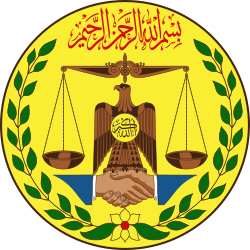 |
|---|
Somaliland elects on national level a head of state (the president) and a legislature. The president is elected by the people for a five-year term. The Parliament (Baarlamaanka) has two chambers. The House of Representatives (Golaha Wakiilada) will have 82 members, elected for a five-year term. The House of Elders (Golaha Guurtida) will have 82 members, representing traditional leaders. Somaliland has a multi-party system, with numerous parties in which no one party often has a chance of gaining power alone, and parties must work with each other to form coalition governments. [1] [2] [3] [4] [5]
Contents
- Latest elections
- Presidential elections
- Parliamentary elections
- Municipal elections
- Past elections
- 2017 presidential election
- 2012 municipal elections
- 2010 presidential election
- 2005 parliamentary election
- 2003 presidential election
- 2002 municipal elections
- 2001 constitutional referendum
- See also
- References
- External links

